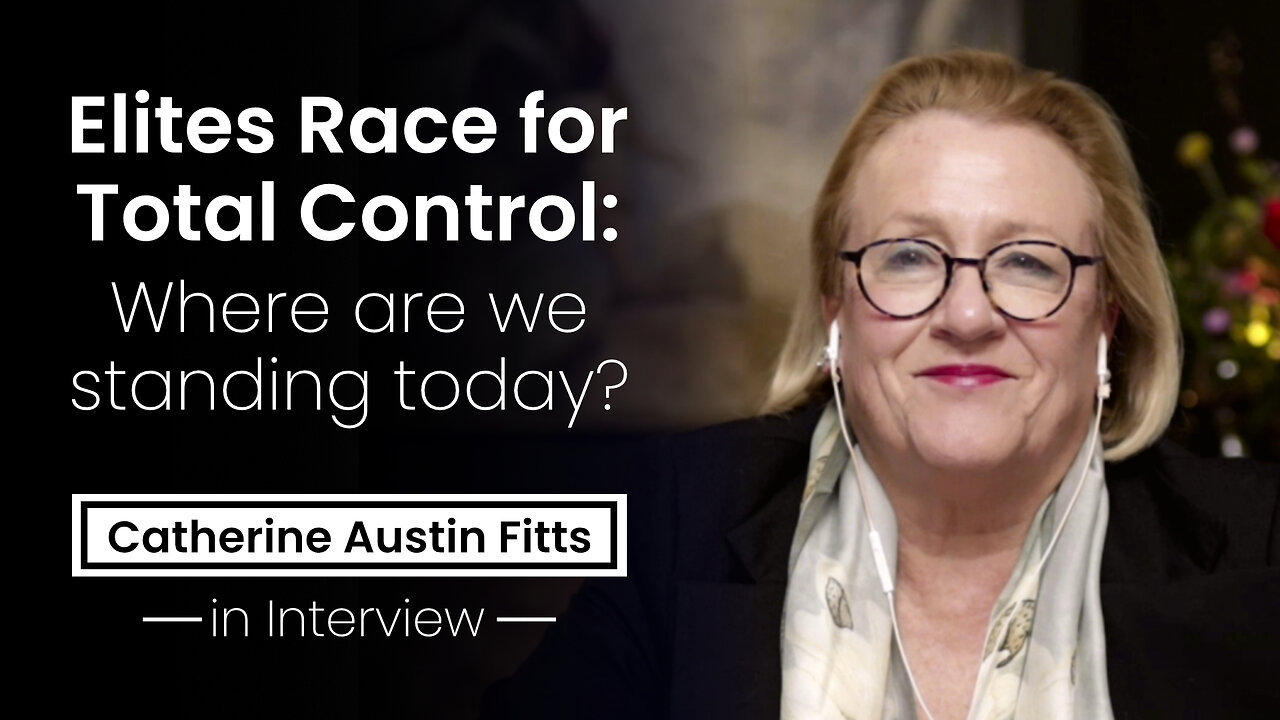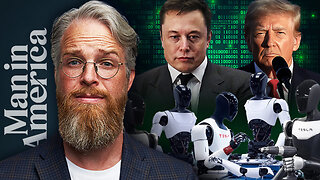Premium Only Content

Elites Race for Total Control: Where are we standing today? Catherine Austin Fitts in Interview
Interviewer: We're really honored to have Catherine Austin-Fitts from the Solari Report back here on KLA.TV. Thank you, Catherine, for joining us.
Catherine Austin Fitts: Oh, thank you. It's always a pleasure.
Interviewer: It's so great that you're here. Catherine, we're in times where lots of stuff is going on. But one thing I wanted to ask you first, and what we briefly talked about before this interview, was the chemtrail ban in Tennessee, where you have a house or where you live part-time of the year. What is that chemtrail ban? How did it come about? And I mean, is it real? Are there no chemtrails anymore in Tennessee?
Catherine Austin Fitts: So let me walk you through that. There is a wonderful activist in Tennessee named Danielle Goodrich. And if you want to get to know about her, we had her on our Financial Rebellion show that we do on CHD.TV. And she brought forward, not this session, the session before, a bill to prevent the spraying, the global spraying in Tennessee. And everyone, including me, would have said, Danielle, and she's very bright and very capable, you know, this is a long shot. There's no way you're going to get this bill passed, particularly in the first legislation. Sometimes in Tennessee, you can see a great bill passed, but it takes like seven legislative sessions before you can get enough people educated to get it through.
Interviewer: Sure.
Catherine Austin Fitts: Anyway, so she goes ahead, you know, you can't stop Danielle. She's amazing. And she gets this bill put in. And it goes to committee where it's considered. Well, what happened was, a gentleman from California came to testify against the bill, explaining that he had a spraying company. And if they outlawed spraying, it would cut his business. Now, well, here's why this was important. Most people in the legislature thought the spraying was a conspiracy theory.
Interviewer: Wow. Yeah. I mean. That's what it was branded all this time.
Catherine Austin Fitts: Right. When this guy shows up complaining that it's going to cut his revenues, suddenly everybody's in shock. Oh, my God. It's not...
Interviewer: It's real.
Catherine Austin Fitts: It's real. Oh, my God. So the bill flies out of committee and gets passed. Now, so this was then a shock. The problem, of course, is, you can, because the state has jurisdiction, it can only enforce it if the plane doing the spraying takes off and lands in Tennessee. So, Kentucky's right across the border, if the plane takes off and lands in Kentucky, we have no enforcement mechanism. So one of the things that's happening, and you often see this in Tennessee, now they're working on how they can get more enforcement powers to do something about it. As far as I know, it hasn't cut any spraying. The reports I'm getting from the United States, I'm in the Netherlands right now, the reports I'm getting say that ever since the inauguration, spraying seems to have cut. And we're wondering if somehow the funding got cut off or delayed in the transfer between the two administrations. But I think this bill was very important in creating more awareness in the different states about the problem. And now we're seeing a lot of other states. Rhode Island had been ahead of us. They were considering legislation before Tennessee. But now you're seeing a lot more other states say, oh my God, this is real. Now, I just have to tell you one other story to brag on my state of Tennessee. There was another bill put in by a really good senator from Lewis County to prevent mRNA vaccines being put in food, particularly lettuce. So in Tennessee, you know, they try not to say no. They just try to make it difficult for something to happen they don't want to happen. So this bill, in fact, said: If you put vaccines in lettuce, then the lettuce has to be sold through a pharmacy, not through a grocery store.
Interviewer: That's smart.
Catherine Austin Fitts: Very smart. They're very good in Tennessee. Anyway, so the bill basically said if you put vaccines in a food, the food has to be sold through a pharmacy, not through a grocery store. So we have a wonderful senator from Nashville, Heidi Campbell, who stood up and said, this is ridiculous! Everybody knows you would never put a vaccine in lettuce. Well, of course, we had the document. And so Senator Niceley stood up and said, Heidi, I hate to tell you, but it's true. And of course, they had articles and evidence and all the studies that show, yeah, they are putting mRNA technology into food. And so now the food is poisoned. And you need to know. But, you know, it's a perfect example of how taking things out of where we discuss them on the Internet and getting them into the legal process, helps to get this communicated. Because when you take it into the legislature, it gets really serious. And that's why it's so important. We have, up on Solari, we have a publication called “What the States Can Do”. And the subtitle is: “Building the Legal and Financial Infrastructure for Financial Freedom”. And it's a description of all the things that the states in the United States can do to protect our financial freedom. And it's it's written for the United States because the states have so much power under the Constitution. But I don't care where you are in Germany, anywhere in Europe. You can take that document. It's public. Took us two years to kind of figure it all out, write it up. So it's a major investment on our part and apply it to your area, because there are so many things we can do to protect our freedoms and our financial freedoms if we take it into the courts, into the legislature, into the government offices. You never know, because, you know, I always say there are allies everywhere. I would have told Danielle, you have no chance. And boom, she got it through in a year, which is amazing.
Interviewer: Yeah, that's so cool. I mean, that shows that people whose heart really is on fire can really change something down here.
Catherine Austin Fitts: Yeah. And I think it's right that you say their hearts are on fire because other people's hearts feel their heart and realize: Wait a minute, you know, maybe I should take this seriously.
Interviewer: Definitely. Yeah. Well, that's pretty good news from Tennessee. Thanks for that.
Catherine Austin Fitts: There's a lot of good news from Tennessee.
Interviewer: That's cool. And so maybe we can dive into other topics that I want to ask you about. And the one I wanted to start with was on your video recently with Naomi Wolf about “President Musk and the DOGE” going into the government agencies and you call what's happening a coup. Now, maybe for everybody who has not been following this, can you briefly fill us in on what happened and what concerns you most about DOGE and what's going on?
Catherine Austin Fitts: OK, so let me start by saying the administration is coming in in a period of great change. And I don't care what administration was coming in, it would have to adjust the country and its financials to that period of change. So let's talk about what's going on. The first thing that's happening is what I call de-globalization. So there's an Australian think tank that did a survey of the top 64 most important technologies. And as of 2007, the United States was leading in 60 of the 64. Today, China is leading in 57 of the 64 and the U. S. is leading in five. OK, and and part of what is happening is, the United States, and this started many years ago, it's not just this administration, is trying to decouple from China, even though U.S. and China are deeply codependent financially and economically. So there's a deep decoupling going on. And as that decoupling happens, we are watching the traditional trade system that the U.S. ran globally come apart. And as it comes apart, you know, so many things are de-globalizing. The pandemic was an acceleration of that de-globalization. And what that means is every supply chain in the world for almost every product is going through an economic repricing. And the U.S. is becoming very scared about the fact that they're losing the technological edge. So they need to respond to the de-globalization. That means re-industrializing and bringing much more back home or bringing it back to North America. And so they need to recalibrate their trade model and and all the products and services and re-industrialize. But what they also need is to catch up on technology. And we know the big technology they're most worried about is A.I.
Interviewer: The big technology that the globalists want to push, I would say is AI.
Catherine Austin Fitts: Here's the problem. Once you let A.I. out of the box, A.I. is escaped from the box. And once A. . escapes from the box, there's an even bigger problem than the globalists. And and so, one question, and I can't answer that question, is could the globalists control AI? And I don't think they can, but we'll see. But whatever, AI is out of the box, and the competition between the U.S. and China over AI is going to cause that to be even more out of the box. So we see this technological race and then this reengineering of the trade model. And one of the things the U.S. is saying to all its trade partners is we can't be the global cop anymore, so we're throwing you out. We're throwing you to the wolves. And we see the Secretary of State, Rubio, say, okay, we're not a unipolar empire anymore. So they don't announce we lost. They just say we're not a unipolar empire anymore. Now we're going to be an empire in a multipolar world, which means we're going to have to deal with China and Russia. The strategy, the Neocon strategy in the Ukraine is we're going to bust Russia. It failed. Okay, so part of accepting the multipolar world is accepting, okay, you know, we lost the Ukraine. We're going to have to let it go. We're going to have to renegotiate with Russia and China. I don't know if you just saw the president's announcement, but he said he's going to propose to Russia and China that the U. S. , Russia, and China all cut. They're defense spending by 50%.
Interviewer: Okay. No, I haven't seen that. No.
Catherine Austin Fitts: So that's ripping around the Internet. And there are a lot of people who are in a state of shock, particularly defense contractors.
Interviewer: Well, that sounds really positive. I mean, to a peace-loving citizen. But kind of weird. I hardly can believe that that will happen.
Catherine Austin Fitts: Well, what the Russians will tell you, the Americans are not agreement capable. Right. So if we make that deal, will we keep that deal?
Interviewer: Yeah, of course.
Catherine Austin Fitts: Okay, so what we're watching, deglobalization, we're watching the shift to the multipolar world. We're watching the U. S. literally tell its allies it's walking away. I don't know if you saw the faces of the European leaders when J. D. Vance announced the AI will be made in America with American chips and you will change your regulations so that our AI can have free reign. Did you see that speech?
Interviewer: No, I didn't. But I saw he was at this AI summit in Paris, right? Probably was there, right?
Catherine Austin Fitts: Yeah. Okay, so we have these various things going on. And that's accelerating change in a radical way that has nothing to do with the leadership in Europe or the United States.
Interviewer: Right.
Catherine Austin Fitts: But it certainly puts all of the leaders in a position, you know, to have to change and have to do things. And part of the challenge they have is how are we going to bring our populations along with us. So you're coming into a major election in Germany. How are you going to educate the populations on what's going on and what you need to do about it? I'm reminded of the guy. He used to be, I guess he was head of Luxembourg. Then he was head of the EU. He once said, said: We know what to do. We just don't know how to get elected after we do it. Anyway, so so this is putting all the leaders in a comfortable position. Okay, so let's get back to DOGE. What's DOGE doing? The first thing that DOGE is doing is it's saying, okay, the old tools that we needed to run things in the unipolar empire are no longer needed. Instead, we need new tools. And in fact, those tools need to be much more high tech and they need to centralize and give us much more control. So we're going from a more covert and invisible financial control to a much more high tech and much uglier kind of control. So, so when you listen to DOGE, they're talking about, aren't we wonderful? We're canceling the old corruption. If you look at what they and the administration are doing to build the tools of the new corruption, I'll take the old corruption any day of the week. And I hated the old corruption. I hated the old corruption.
Interviewer: I think we all did.
Catherine Austin Fitts: So we're going from old tools to new tools. And there's a wonderful commentator. His name is Brian Berlitek, I think is how you pronounce it. And he just did a.
Interviewer: Oh, I watched that with the sword, right?
Catherine Austin Fitts: Yeah, with the sword. He just did a wonderful video on old tools, new tools. And he just nails it. He just really nails it. It's very good. Anyway, so when you look at the new tools, there are two things you need to remember. One is: our biggest sign of corruption over the last three decades in America is the fact that since 1998, we have failed to obey the financial management laws. So America has been operated financially way outside of the law. During that period, as of 2015, 21 trillion had gone missing from the US government. And the reason we only know up until 2015 is in 2018 the Trump administration instituted a new policy called FASAB-56, F -A -S -A -B -56. And that policy allowed the U. S. government by administrative order to keep secret books. Now, let's say that you and I were coming in as DOGE to the U. S. government. We were going to stop the corruption. The first thing we would do is say, no more secret books. We're going to cancel FASAB-56 and bring sunshine to the U.S. government finances. And then the second thing we're going to do is we're going to start obeying the federal financial management laws. And part of that is we're going to go over and audit the Pentagon and the Treasury and the Department of Housing and Urban Development and the New York Fed accounts for those agencies, those three agencies in the U. S. government. We're not going to audit the New York FED. We're going to audit the Treasury and HUD and DOD accounts at the New York FED. And see how much money they've been sending to the B. I. S. and central banks and other people around the world, including the Clinton Foundation and the Gates Foundation. And we're going to find that $21 trillion. And we're going to assert ownership of those assets. Right? Did they say that? No.
Interviewer: Guess not.
Catherine Austin Fitts: No, they didn't mention FASAB-56. They left that place.
Interviewer: They're working hard at USAID.
Catherine Austin Fitts: So that's a little bit like you're not going to deal with the tank rolling down the street. You're going to take out a pea shooter and, you know, and hit a bottle cap. I mean, it's just a joke. Okay. Not to say that it feels like a joke to the people who are getting their money cut off. But, you know, what you're doing is you're canceling the old tools and you're putting into place new tools. Now, let's look at the new control grid they're doing. So the control grid needs a couple things to happen. The first thing it needs is a digital ID. And we're seeing enormous pressure at the federal and state level to push digital IDs. Okay. The second thing you need is you need to destroy Congress's control of fiscal operations. If you get rid of the civil service and you do what they're doing now, you significantly weaken and you can even destroy the fiscal control by the people's representatives. Remember, the U. S. government is a balance of power between the banks that control monetary policy and Congress that controls fiscal policy. If you can put contractors, corporate contractors in control of fiscal policy by refusing to do what Congress says, do whatever you want, but get rid of the civil service and put corporate contractors in control, that's how you let the bankers control.
So when the new government came in during austerity in Greece, they found they couldn't control the tax receipts because they were collected on payment systems by corporate contractors who did whatever the ECB told them to do. And they lost control. So without a civil service under the law reporting to the Congress, the people's representatives lose control to the central bankers of that side of the house. Okay. So what are we seeing? We're seeing assault on trying to persuade everybody that the civil service is the deep state, which is the most ridiculous thing I've ever heard. I mean, that's like me telling you that your child runs your household and you and your wife can't do anything because he can boss you around all day long. It's ridiculous. Okay. So the third thing you need is you need an all digital monetary system so that you can implement social credit and you can control people's financial transactions. You can do that. You need it to be all digital. That's what's important. You can do it with CBDC. You can do it with credit cards. You can do it with bank accounts. You can do it with crypto. You just need 100% digital. And they're clearly moving to do that. To make digital ID and the all-digital monetary system happen, you need huge investment in data centers all across the country. And, of course, we have Stargate, which is what, 500 trillion, $500 billion. $500 billion.
Interviewer: $500 billion. They are building the first 10 data centers, right, I heard.
Catherine Austin Fitts: So and we're seeing all across the country a push to get radical investment in the energy. You need that to do that now. Here's what's very interesting. You know, anybody who believes in climate change can't possibly be doing this.
Interviewer: Exactly.
Catherine Austin Fitts: Which is why the old guys had to go. But what's important to understand, many people have said, oh, well, the $500 billion is private investment. No. If you look at who's making those investments, you know, they're all government contractors. So they get massive purchases from the government. And what I will tell you one way or another, that money is going to come out of government credit, the taxpayers or certainly a lot of it, if not all of it. But they're also marrying it with mRNA vaccines. And the question is why? Because we proved beyond any shadow of a doubt that the mRNA technology is poisonous to people.
Interviewer: Yeah.
Catherine Austin Fitts: Right. And so but it does beg the question. There's a great body of evidence to suggest that mRNA technology is being used to integrate the particles into our bodies that are necessary to create the Internet of Bodies. And interestingly enough, as the president brought up the Stargate initiative, the Purdue Engineering Center announced their new center for the Internet of Bodies. And if you go look at it, it's, you know, David Hughes and his group did a wonderful symposium. And it's now translated into German. It's fabulous. With Patrick Wood on Omniwar. And Omniwar is the weaponization of everything. But Lissa Johnson did a presentation on the nanoparticles in the Internet of the the bodies that was just tremendous. And I recommend that to you. And again, apparently they've they've translated into German by now.
Interviewer: What's his first name? Johnson.
Catherine Austin Fitts: David Hughes, and the presentation that I found the most interesting on this point is Lissa Johnson, L -I -S -S -A, Johnson. She's an Australian scientist and researcher and doing remarkable, remarkable work.
Interviewer: Yeah, it's insane what's going on. We just interviewed Dr. Broudy.
Catherine Austin Fitts: Daniel. Yeah. So Daniel was yeah, there were three presentations. It was David, Lissa and Daniel. And they're fabulous. They've done great work.
Interviewer: It's insane when he lays out all these whitepapers. The European Unio, the U.S. thinking about these enhanced people as freaked, the geeked and the tweaked in the future humanity, that is just completely controllable.
Catherine Austin Fitts: So always when people tell me, oh, Elon Musk is so cool. First of all, I would like to point out I've counted I think there are at least 30 actors playing Elon Musk, and I'll tell you why. If he's running six companies, it takes one person to run each of those companies. So that's six people. He's tendering for OpenAI. That's another person. That's seven people. If you look at the X patterns for Elon Musk, you got three to five people posting 24 -7 around the clock. So let's say we're up to 12 people.
Interviewer: And somebody's gaming all the time.
Catherine Austin Fitts: Yes. So the gaming is one to three people. That puts us at 15. Then you have all the events all over the world. I figure that's another five. We're up to 20. And then you have DOGE. How many people? One to three for DOGE? And just keep counting. And you'll get, you know, so.
Interviewer: I'm convinced that's true. Yeah.
Catherine Austin Fitts: Right. Elon Musk is an operation. And somewhere there's a command center. And you've got the group doing the social media and you've got the group writing the speeches. And do you know what I mean? It's like a theater. So you're in Europe, you know what DOGE means.
Interviewer: Yeah. I heard that that was the head of, what was it? The black nobility [Doge = Chief magistrate and leader of the Republic of Venice during its 1000 + year existence, elected by the most powerful noble families, also referred to as black nobility] in Italy?
Catherine Austin Fitts: Yeah. In Venice. Right.
Interviewer: Right. Exactly. Now, you said in one of your speeches that or in one of your recent interviews that the central bankers are really comfortable with what's happening. You don't see anything, any adverse reaction on the market, or in the banks. So do the central banks and do high finance support all of this?
Catherine Austin Fitts: So if you look, I took the position in early summer that there had been a series of signals that indicated the Republican establishment was going to use Trump to get their control grid. In other words, they didn't think that Democrats could get the control grid. They thought Trump could. And they would use Trump to sell the control grid to conservatives, which is exactly what's happening. So I think this was promoted to get the control grid. I think a lot of the traditional central bankers are not pleased to see this kind of shock and awe and chaos.
Interviewer: Okay.
Catherine Austin Fitts: You know, so if you're Jerome Powell, and you're watching this, or you're Gary Gensler, and you're watching this, you find this deeply distasteful. Do you know what I mean? I mean, the idea, when I was in the federal government we gave major donors presidential cufflinks. And I remember when I first became Assistant Secretary of Housing, I asked why a clearly corrupt mortgage banker was being given 450 million of federal credit, when he clearly didn't warrant it. And somebody turned to me and said, he's a major Republican donor. And I said, you give donors presidential cufflinks, you don't give them 450 million of the federal credit. That was considered to be wildly corrupt. The fact that you would give your largest donor immediate access to the Treasury payment systems and data. I mean, that takes it to a whole new level. That's worth a lot more than $450 million. I mean, you're giving him all the data to his competitors, right?
Interviewer: Yep.
Catherine Austin Fitts: Right. I mean, how much did he give? 250 to 270, somewhere around there. I mean, that's cheap at any price. And if you look at all the agencies that were investigating one of Musk's companies before this started, there's clear sort of indication that people have been fired, or those investigations are stopped, or those rules have been changed. I would say whatever he gave, let's just pick a number, 250 million, that's the best investment he's ever made.
Interviewer: Yeah, the Musk operation. Plus, if you feed the whole government system history of the US into the AI, you make AI, like, as powerful as an American government, right?
Catherine Austin Fitts: Well, here's the thing. If you look at what makes an AI good, the thing that makes an AI good is not the best software developer, it's the most data.
Interviewer: Definitely. Yep. That's why everybody's saying data is a new gold, data is a new oil. It makes their AI run, yeah.
Catherine Austin Fitts: Right. So, the logical thing is going around and giving access to the AI to all this data. Now, the violations of national security and privacy laws are so off the charts. You know, I'm sure if I got in a room with these guys, they might say, look, we're in a race with China, this is what we have to do to win against China. We have to feed. . . There's always these reasons. So. . .
Interviewer: Very convenient. Yeah.
Catherine Austin Fitts: I don't know what they would say, but what I would say is, you know, if the last guys were corrupt, if you look at the laws that are probably being broken now, it's much worse.
Interviewer: Yeah. Coming back to, like, the Fed or the central bankers, you say they could stop kind of money flows if they weren't supportive of this?
Catherine Austin Fitts: Like that. Are you kidding me? The US government is dependent every day on getting more money from the bond market. It operates at a deficit. Where does it get that money? It gets that money from the primary dealer system [Primary dealer system = a firm that buys government securities directly from a government, with the intention of reselling them to others, thus acting as a market maker of government securities.] operated by the New York FED.
Interviewer: And they're keeping the money flowing?
Catherine Austin Fitts: Wait, but here's the thing. Yeah. The New York Fed is the banker. It is the depository for the US government, okay? So let's say you were being really, really bad. You were laundering money, and your bank said, you know something? We're not going to let you do that anymore. We're going to freeze your bank account, right? Under the know-your-banker, know-your-customer rule in the United States they can do that like that. But every day, they're pumping out the money, and every day, they're selling bonds to investors and putting the money in the account so that these guys can keep paying their bills and going along. The minute the New York FED decides this stops, it stops. Right?
Interviewer: Yep.
Catherine Austin Fitts: Right? Okay. So one of the great lines at the beginning of the administration was there was a reporter from Politico. So we just published the first episode in War for Bankocracy on the Solari Report, but we also ran this in Money and Markets. A Politico reporter stood up and said to Jay Powell, the chairman of the Federal Reserve: If the president asks you to resign, will you? And he says, no. And he says, well, can the president fire you? And he says, no. That's how it works.
Interviewer: Yep. That's where the power is.
Catherine Austin Fitts: He does not serve at the pleasure of the president. Well, the power resides in the president of the New York FED. The New York FED controls the train tracks. Now, the train tracks work through the 12 Federal Reserve banks, but the mother of all train tracks, primary dealer, banking depository, and manages the exchange stabilization fund [exchange stabilization fund = an emergency reserve fund of the United States Treasury Department, normally used for foreign exchange intervention. This arrangement allows the US government to influence currency exchange rates without directly affecting domestic money supply.] for the Secretary of the Treasury. And the exchange stabilization fund is the mother of all slush funds [slush fund = an amount of money that is set aside as reserve and commonly used for dishonest or illegal activities in politics or business]. And if you freeze the exchange stabilization fund and the bank accounts and the primary dealer network, all covert operations, U. S. and the world stop. Military stops.
Interviewer: Wow. Okay. Well, that's really interesting. Anyway, I want to move on to the next topic. And that would be, and I think it's just as interesting, the crypto hype that Trump has ignited now, for example, a few days before taking office with meme coin. And maybe before we dive into the Bitcoin strategic reserve in particular, who do you think is a mastermind behind these all digital currencies? And what do you think is the outcome supposed to be of this crypto hype being ignited?
Catherine Austin Fitts: So, you know, so it's a rich and complex space, crypto, because you have Bitcoin, which is a Ponzi scheme [Ponzi scheme = an investment fraud that pays existing investors with funds collected from new investors], then you have stablecoin, which is being used to promote the dollar hegemony worldwide. And then you have a variety of cryptos of people who sincerely want to provide alternative payment systems. So it's not one thing. It's many things. Now, why is it being promoted? One is because digital technology allows you to do a lot more than you could do in the old infrastructure. And people want to try and do that. And they want to get cross border payments quickly with lower fees, et cetera. So there's a natural inclination to use new technology and prototype all sorts of new things you can do. When I had a company in Washington called Hamilton Securities. And when the internet first came along, we got very excited about this and created something called just in time money. But because we were so excited about the technology, so part of it is that. The people who've really been promoting crypto are the ones who want an all-digital monetary system for control. In other words, they want a cancel currency, because they want a control grid. And, and so it is very much in their interest to encourage people to prototype and try things, one, to figure out how to do it. So you want, you want people who are trying to build freedom to instead prototype, how to do your control grid, how to use this stuff.
So part of it is you're trying to get everybody to prototype it and figure it out. But I think ultimately what they want is an all-digital monetary system, and they're trying to figure out what's the best way to get there. And crypto is a part of that. But, you know, so is everything that's going on with dollars. So is everything that is going on with frequent flyer myers. So is everything, all digital transactions, are working and being used to go towards there. Now, that doesn't mean everybody in that space wants to be part of a digital control grid.
Interviewer: Right. At all. Right. No, definitely. Yeah.
Catherine Austin Fitts: Right, right. Okay. So, so what's happening with the Bitcoin Strategic Reserve?
Interviewer: Right, that would be my next question.
Catherine Austin Fitts: Okay, so you have several things going on in the government. So you have David Sachs, running a group that's looking at, should we do a strategic reserve?
Interviewer: So it's still in like, they're still considering it, it's not yet law, the Bitcoin Strategic Reserve?
Catherine Austin Fitts: No, it's what happened was the Department of Justice has seized Bitcoin. And it had 210,000 Bitcoin, I think, but it was selling it. And so Trump said he was going to fire Gary Gensler, and then he was going to freeze the sales. And he was proposing to move it over to Treasury. But now what he said is he's brought Sachs in as the crypto and A.I. czar. And he said to Sachs, okay, figure out what we should do here. Now, then he's taken the Secretary of Treasury and the Secretary of Commerce. Lutnik, who's not yet confirmed, and put them in charge of figuring out a sovereign wealth fund, which he's created by executive order. So you got the crypto committee, if you will, because Sachs is bringing in, I think, an advisory board of people. And then you've got the sovereign wealth fund team.
And here's where I think they're headed. You also have an effort to persuade the states to start to mandate purchases of Bitcoin. Now, if you look at Bitcoin, there is no reason why any government would ever buy Bitcoin. And that is because if you look at all the arguments that say it protects you against inflation, they're just not true. One, the 21 million limit is not hard. And two, we know there's inflation bugs. Not to mention the ETFs [ETF = exchange traded fund, a fund holding multiple underlying assets and is traded on an exchange] don't have to be fully collateralized. You have no idea the games that could go on there. So the notion that Bitcoin is going to protect you against inflation. It's just patently ridiculous. And if you look at Bitcoin, it doesn't function as a payment system. It doesn't have any utilitarian purpose. And if you want to understand more about Bitcoin, I would really recommend „hijacking Bitcoin“ by Roger Ver and Steve Patterson. I just did an interview with Steve Patterson and they did a great job of explaining why the initial design of Bitcoin could have been a great thing. I mean, if Bitcoin had held true to its design, it could have really been a wonderful global payment system. And maybe it wouldn't have been anywhere near as fast as Visa and MasterCard, but it still could have been quite a great community. And instead, it got hijacked and converted into something that was perfect for a pump and dump tool [Pump and dump=
artificially inflating the price of an owned stock through false and misleading positive statements, in order to sell the cheaply purchased stock at a higher price.]. And it's done a great job of creating a speculative pump and dump kind of vehicle anyway. So, the notion that a government, if a government can afford to buy Bitcoin, it can afford to lower taxes.
Interviewer: Right, yes.
Catherine Austin Fitts: Right. Because if you want to buy Bitcoin as a private person, that should be your right. But you don't need government to mandate taxes, collect taxes and then put your money in a speculative asset. You should do that, not government. So, you know, so whether it's government making sure, you know, I would say I would much prefer the city of L.A. to have working fire hydrants than to buy Bitcoin, right?
Interviewer: Yep I agree!
Catherine Austin Fitts: Okay. Right. And so you serve your government or purpose. And then if you've satisfied your governmental purpose, you lower taxes and give the money back and let other people make investments. Okay, so that's number one. To me, governments can if they can afford to buy into speculative assets, they can afford to lower taxes. But let me keep going. We talked about de-globalization. We talked about A.I. In an environment of de-globalization, what should governments do if they're going to make speculative investments or equity investments? What they should do is make sure you are winning at technology because we know you got to win at technology. The competition over technology is very serious. And so whether it's science and technology or education, you want to make sure you're staying in the competition, right? So that's one. And that's a role of government. The second thing is, if all the trading economics are being thrown up in the air. You need to seriously transition your economy to do whether it's imports, exports or doing more resilient, self-sufficient for yourself. You want to make sure your industry is as efficient as possible. So if the war in Ukraine is going to end, if you're Germany, you want to bring in Russian gas and bring all those companies back to Germany. You want to make sure, you know, one of Germany's great traditional strengths is its banking system that has really fed liquidity to all the small businesses that are very competitive and do do a lot of exports globally. You want that banking system to be healthy. You need to put your money into making sure that the liquidity is getting to the small business enterprises as opposed to putting it in digital assets. It doesn't make sense.
Interviewer: So looking at that the other way around, if you put it into these Bitcoin or whatever speculative assets, then you're taken away from the small companies and the the people basically. Right?
Catherine Austin Fitts: You're taking. You're taking stuff away from the economic muscle and putting it into economic sugar on the theory that you can catch the wave right. The reason Bitcoin works as an investment is: in a pump and dump, you have to bring in a new wave of investors. Right. And the problem with Bitcoin, you have, the last time I looked, you have about 2% of the holders who have about 70% of the Bitcoin. They have huge positions. They have no way of getting out unless you bring in a whole new wave. If they try to get out now, they they drive the price way, way down. So their positions are highly illiquid. How do they get out? Well, the way you get out, especially if you can make it secret and tax free, is you mandate government purchases and you sell into government. Now, government's the last investor in the Ponzi scheme because there's no one else to bring in. Right?
Interviewer: Right.
Catherine Austin Fitts: Right. But if if you let me mandate purchases of jello, I can run the price of jello or silly putty up to the moon. Right. Anybody can do that. That's just a financial play. But if you can if you can talk governments with enough political contributions, because remember, you've got the price pumped high. That's the basis of big political contributions. And we saw in the presidential campaign in the US, crypto was the biggest source of political contributions. So you buy enough governments, you get them to mandate purchases. Where's that money going to come from? It's going to come from taxpayers, but it's going to come from their retirement savings because that's what, when government issues bonds and borrows money, that's what it's doing. So it's taxpayers money or their retirement savings. Once you finish mandating, what can the guys do who have the two percent that's now 70 percent of the Bitcoin? Well, they can swap Bitcoin for land. What does government own? So Howard Lutnik, the secretary of commerce, has said the US government has 500 trillion of land and mineral resources, 500 trillion. If you can get Bitcoin high enough, you can swap for that land. And we've seen some of the trial balloons proposing that if you swap for real estate, it's tax free. And since their cost basis is very low, what a steal. Right. So you want to get out of the unreal and you want to get the real.
Interviewer: At the expense of the of the muscle, as you say, of all of us. Right. At the expense of all nations, basically right?
Catherine Austin Fitts: Right. Whether it's owning our land or investing in our young people and making sure they have the kind of technological skills we need them to have. Or repricing how to be competitive globally in changing trading economics. There are multiple areas we need to invest to build our muscle. So my attitude is if your government, if the German government wants to own digital assets, have them create some and they can buy that. Right. Right? No. Or you're, you know, Hessia or Bavaria can create a community currency. And they can buy that. And then you have more liquidity globally to invest in the entrepreneurial changes that need to be made. If you want digital assets, just make them yourself. Right?
Interviewer: Right!
Catherine Austin Fitts: Why do you have to buy them from somebody overseas? That's crazy. Right!
Interviewer: And speaking of this land grab, I think that's that's really interesting because this whole I mean, I saw the natural assets companies were being proposed at the New York Stock Exchange. I saw they turned them down or are considering it still. But I wanted to ask you this…
Catherine Austin Fitts: What happened was, I'll tell you what happened. What happened was a very brilliant and courageous treasurer, the treasurer of Utah, led a group of conservative treasurers. And then the AGs came in, too. And you had, I think, 24, many treasurers. And then I think it was 26 AGs who started campaigning and hooked up with some very good people in Congress. And you had this beautiful alignment of some congressional members and the conservative state treasurers and AGs. And finally, what happened was it turned into such a roar that Gary Gensler head of the SEC shut it down and just said, we're pulling the rule. And it was a remarkable, you know, it just goes to show you „get off the couch and start fighting because you never know what will happen“. When the treasurer of Utah started to do that, everybody thought it was hopeless. But look what happened!
Interviewer: Like with the chemtrails in Tennessee.
Catherine Austin Fitts: Exactly. When Danielle did that, you know, and that's why I keep telling everybody, if you see all the great things that have happened, for freedom in the last two years, you know, it always looks hopeless and we always hear that it's hopeless. And then it works. And that's why you just never know. You have to keep pushing.
Interviewer: What a beautiful message. Yeah.
Catherine Austin Fitts: You know, it's funny if you go to „What the states can do“. We have a very detailed PTF and it's all the different ideas. And one of the ideas we most promote is using cash. And people always tell me, oh that will never work. Cash is over. It's going away. And yet what I'm seeing in many different places is cash is rising. Because people are realizing, oh, they want me off of cash so they can control me. And so the more they use cash… I had one subscriber call me not that long ago and she said, !you're not going to believe this. I was on the phone. I've been trying to order new checks“. And and she said, „I haven't been able to get through to the company. The number is busy, busy, busy. I finally got through after three days and I was very frustrated. I said, what in the world is going on? And the woman said, you're not going to believe it. Since last October, the check ordering has gone off the roof. We're just we're all working overtime. We're training new people and we can't keep up. It's just unbelievable. And she said, well, what's going on? And she said, I don't know. But we have so many orders from young people. And the reason it's so time consuming is they've never used checks. So we have to explain to them how to use checks.“ But they've figured out, you know, oh, I want to use checks.
Interviewer And I think, if you ask me, that's also due to your great work. And all these people who are educating people on freedom and financial freedom and what it takes to to stay independent and free from tyrants who want to enslave us. Right. So to all our viewers check out the Solari Report. It's it's really important work that you're doing.
Catherine Austin Fitts: OK, well, I appreciate it because I want to be free and I figured out a long time ago.That's why I left Washington. I couldn't be free unless everybody was. And that did seem like an overwhelming task. But you never know.
Interviewer: That's also a really good sentence. That's what we believe in, too, here at KLA. We can't be free if unless everybody is right. We are in this together. Yeah, what a nice message.
Catherine Austin Fitts: Yeah. What a great group of people to hang out with?
Interviewer: Right.
Catherine Austin Fitts: I'm telling you, the caliber of person you hang out with on this side is...
Interviewer: It‘s amazing. Definitely.
Interviewer: Well, Catherine, I think I'll leave it on that note for today. Maybe one last message. Where can where can people find your work?
Catherine Austin Fitts: So, I'm at Solari.com. You can branch out to everything from Solari.com. We're publishing the Solari Report, it's a subscription based service. So all sorts of people tried to get me to throw my hat in the ring for the new administration. And I said, no, no, no I have a boss. I love my boss. I have the best boss in the world. So I've subscribers all over the world and we work for them. But there's a ton of free information, including „What the states can do“. And, you know, we're all about solutions. So come on into Solari. You don't have to subscribe. There's a ton of things about what you can do. And, you know, just jump in anywhere. I used to always have this on my refrigerator, It‘s from the musician John Cage. It says „begin anywhere“. So get off the couch and just start taking action.
Interviewer: Perfect. Perfect. Thanks so much for coming on and sharing all this great insight with us. It was a pleasure!
Catherine Austin Fitts: OK, well, OK. Thank you. Have a great day.
Interviewer: Thank you. You, too.
from dag.
Sources/Links:
https://rumble.com/v6juwsv-doge-is-sharpening-the-tools-of-us-empire-not-dismantling-them.html?e9s=src_v1_ucp
https://home.solari.com/trump-administration-digital-control-grid-coming-together-at-high-speed/
https://www.goodreads.com/quotes/454948-we-all-know-what-to-do-but-we-don-t-know
-
 17:53
17:53
Forrest Galante
5 hours agoHow I Joined a Dangerous Remote Tribe (feat. Nelk Boys)
6.38K -
 LIVE
LIVE
Vocalot
17 hours agoDay 6! New Here! New Rumble Friends!? 🤙
1,604 watching -
 34:27
34:27
The Connect: With Johnny Mitchell
10 hours ago $2.51 earnedCan He Stop Them? Inside Trumps War On Mexican Drug Cartels & The New Era Of Mexican Organized Crime
9.55K2 -
 2:33:15
2:33:15
Tundra Tactical
3 hours ago $2.49 earnedLuis Valdes Of GOA Joins The Worlds Okayest Firearms Live Stream!!!
10.6K -
 1:03:41
1:03:41
Man in America
11 hours agoAre Trump & Musk the COUNTER-ELITES? w/ Derrick Broze
32.5K15 -
 LIVE
LIVE
DLDAfterDark
2 hours ago $3.07 earnedDLD Live! SHTF Handguns! Which Would You Choose?
629 watching -
 1:50:38
1:50:38
Mally_Mouse
5 hours agoSaturday Shenanigans!! - Let's Play: Mario Party Jamboree
31.3K -
 1:13:00
1:13:00
Patriots With Grit
9 hours agoWill Americans Rise Up? | Jeff Calhoun
24.9K10 -
 14:55
14:55
Exploring With Nug
9 hours ago $8.88 earnedWe Found Semi Truck Containers While Searching for Missing Man!
44K7 -
 27:57
27:57
MYLUNCHBREAK CHANNEL PAGE
17 hours agoOff Limits to the Public - Pt 3
86.6K57